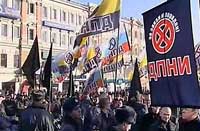Russian nationalists to launch Russian March under racist slogans nationwide
Members of Russian ultra radical nationalist organizations are planning to conduct large-scale protests in Moscow and other major cities despite the ban imposed by the authorities.

Activists of the Movement Against Illegal Immigration are going to hold the so-called Russian March and violent protests in large Russian cities on November 4, the Day of National Unity, a public holiday in Russia.
Organizers of the Russian March applied to Moscow authorities for permission, which was denied. However, it is still unclear whether nationalists are going to obey the orders and scrap their plans. Organizers of the Russian March say they will go ahead with the rally anyway. Information to keep the supporters abreast of a time and place of November 4 meeting has been already posted on the web site of the Movement Against Illegal Immigration.
According to information on the web site, participants are supposed to gather at Komsomolskaya metro station around 10 a.m. on Saturday. According to the plan, the location of a main rally will be announced after all the participants are in place. Should the station be cordoned off by the police, the march participants will relocate to the next station along the circular line of the Moscow metro. The change of a station will be repeated if need be. In any case, the police neither will nor dare seal off the entire circular line, say the organizers.
Organizers of the Russian March did not have much of a doubt about the decision of the authorities to ban the demonstration. “The police can stop us on the streets but there’s no way they can seal off the whole circular line of the metro. They authorities will not dare take such a step,” Nikolai Kuryanovich, one of the organizers and the Duma deputy who was recently expelled from the Russian Liberal Democratic Party, was quoted as saying by Kommersant.
“We may exit the metro. We’ve got plenty of options. One of our groups got permission to hold a meeting near the Leo Tolstoy monument in the vicinity of Park Kultyry metro station. We might as well carry out a marching and meeting right in the metro,” added Kuryanovich.
Nikolai Ivanov, chief of the Moscow metro police, said that the police would not allow any illegal and extremist developments including the “Russian March” in the metro on November 4.
“We will take every possible step to prevent such actions. The metro is for the benefit of its passengers, it’s not meant for any marches. Let them go marching on the streets if they want to,” said Ivanov to Interfax, in an interview on Wednesday.
Ivanov said that the police would start to tighten up security in the metro as of November 2. “We will bring reinforcements and take other necessary steps. We are certain that we’ll be capable of foiling any extremist or illegal activities aimed at disrupting situation in the city’s metro,” said Ivanov.
Chief of the Moscow metro Dmitry Gayev said earlier that no violations of the rules applicable to the use of the metro would be allowed on the Day of National Unity.
“According to rules of the use of the underground railway, no one must prevent passengers from moving freely along the stations and passages. Anybody who should obstruct the movement of passengers will be subject to adequate response by the police. The perpetrators will be ejected outside the metro,” said Gayev.
“I’m afraid the march will take place despite the ban imposed by Moscow Mayor Luzhkov,” said the human rights activist Lyudmila Alexeieva, chairwoman of the Moscow Helsinki Group, in an interview to Interfax on Wednesday.
“Judging by the reports available in the Internet, the radicals are planning to take action in any case. They are trying to gather not only Muscovites but residents of other Russian regions as well,” Alexeieva was quoted as saying by Interfax.
Alexeieva said that mass demonstrations under racist slogans would be undesirable for Russia. On the other hand, she said that banning a public meeting would be against the law; the authorities could only issue orders to change the location of a meeting.
“The law is for information purposes, it’s not devised as a means for granting permission. However, the Russian authorities have appropriated the right to okay or ban at their discretion,” said Alexeieva.
She also informed that human rights activists and politicians were planning to hold an antifascist meeting in Moscow on November 4th. The meeting will be held in a public garden next to the Udarnik motion-picture theater.
Moscow Mayor Yuri Luzhkov announced the ban on the marching of ultra nationalists planned for November 4 while speaking to NTV on a Tuesday night. “I made a decision to ban the so-called Russian March. I appreciate that those extremists may try and stage something of the kind somewhere else in the city. However, we shouldn’t allow this sort of activities to do damage to the unity of our society,” said Luzhkov.
The speaker of the Council of Federation Sergei Mironov expressed his support for Luzhkov’s decision. “I believe that fascist thugs should be banned from carrying out their explicit propaganda actions in Russia. The situation is simply unacceptable in a country that defeated fascism,” Mironov said in an interview to Ekho Moskvy radio station on Wednesday.
“It’s obvious that large-scale unrest would have broken out in the city had the authorities made a different decision,” Mironov said. In his turn, Luzhkov called attention to the attempts to carry similar actions despite the official ban.
Based on Russian media news reports
Translated by Guerman Grachev
Join Pravda.ru forum community for free to speak your mind
Subscribe to Pravda.Ru Telegram channel, Facebook, RSS!





